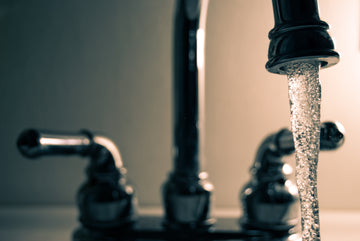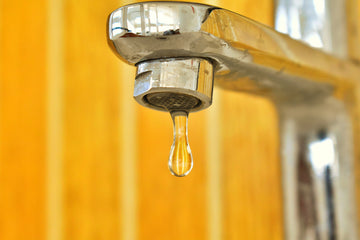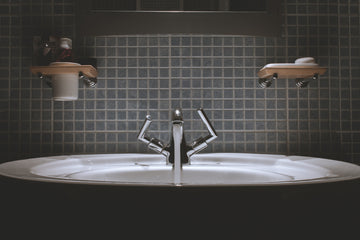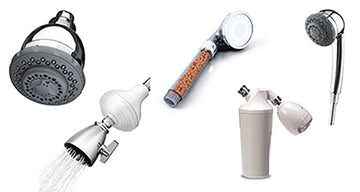

Today we are gonna talk about Hard Water and Soft Water in our daily. I believe that you’ve probably heard the terms “hard water” and “soft water.” And you may wonder what determines the hardness or softness of water and whether one type of water is healthier or safer to use or drink than the other.
This article will discuss the differences between the two types of water, as well as the pros and cons of each.
What is Hard Water? And What's the Difference Between Hard Water and Soft Water?
I asure everyone knows that water is just H20, just two hydrogenatoms along with one oxygen, right? Although water is typically crystal clear, the water you’re drinking and showering with is nowhere near this pure, it contains minerals and chemicals. The concentration of certain minerals is what creates the “hardness” of water.

Simply put, hard water is water that contains too many minerals. More specifically, if water contains more than 3-7 GPG (grains per gallon) of minerals such as calcium and magnesium, it’s considered slightly hard. 7-10 GPG signifies hard water, and more than 15 means that your water is extremely hard.
Instead of having higher levels of calcium and magnesium, soft water tends to have higher concentrations of sodium or salt.
A Simple Way To Distinguish Between Hard Water and Soft Water
This way is to add soap to water.
Hard water is water that does not easily form lather with soap. While soft water forms lather when soap is added, hard water forms scum when soap reacts with the solid impurities.
Hard water forms lather once all the solid impurities have reacted with the soap. Therefore hard water needs a larger amount of soap to form lather.

The Pros And Cons
The Cons of Hard Water
There are many negative effects that hard water can cause. But thankfully, none of them can have a severe impact on our health associated with drinking or using hard water. However, hard water still can cause some issues in your daily. Here are some of the main issues:
Damaged Skin and Hair
Hard water can contribute to dry skin and hair. Washing your hair frequently with hard water can leave your scalp feeling itchy.
The minerals in hard water can also change the pH balance of your skin, weakening it as a barrier against harmful bacteria and infections. People with eczema may be especially vulnerable.
Ineffective Reaction with Soap
The presence of minerals in hard water prevents soap from dissolving completely. This means that you might not be able to clean your skin and hair properly, and you need to rinse for longer to get the soap off your skin.
You might notice soap residue on your body, hair, and your tub or shower. This is another factor that contributes to lower skin and hair quality, as it can cause skin irritation and blackheads.
Weird Smell or Taste
While in the shower with hard water, you might notice that your water smells funny. And if you try tasting it, it would has a metallic taste or even tasting like dirt. It’s the minerals dissolved in it that give it that taste. Though this is not likely to cause ill health, but it’s obviously unpleasant and make showering dreadful.
Plumbing Issues
Have you ever seen that white stuff on your showerhead? It’s actually the mineral deposits that have built up over time. It can affect the flow rate of your shower. However, the problem doesn’t stop there. That same scale builds up in your pipes, which can cause many issues.
For starters, water tends to get harder as it flows through narrow pipes due to mineral deposits. This exacerbates all the problems that hard water causes to your skin and hair health and appearance.
As you can probably imagine, there will come a time when pipes become overly clogged and put too much pressure on the fittings to the point of leaks and failures.
The Pros of Hard Water
Because hard water contains high concentrations of magnesium and calcium, drinking hard water may help you get your recommended daily intake of these essential minerals.
The Cons of Soft Water
If your diet typically includes rich sources of calcium and magnesium, then there are likely no risks in drinking water with lower concentrations of these minerals. But for people with high blood pressure who could be susceptible to the blood pressure-raising effects of drinking water with a higher sodium content. Just as some with high blood pressure are advised against adding salt to their food, they may be advised against softening their home drinking water.
The Pros of Soft Water
Soft water is preferred for cleaning, as it doesn’t tend to cause soap scum or mineral stains. Since it’s a more efficient and effective cleaning agent, you may save money on your water bill by not having to re-wash clothes or dishes, or taking longer showers to feel fully cleaned and rinsed.
The Final Word
So you have a clearer understanding of hard water and soft water now? In fact, hard water is still widely used in our daily lives, and soft water is becoming an increasingly popular choice. Both soft water and hard water have their pros and cons. The most appropriate and best choice is to choose according to your own situation.




